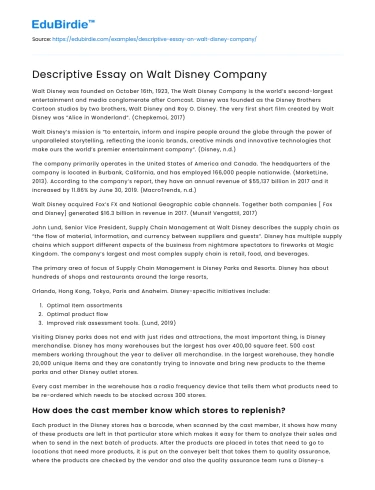Introduction
The Walt Disney Company, an emblem of creativity and innovation, has profoundly influenced global entertainment landscapes. Established in 1923 by Walt and Roy Disney, the company has evolved from a modest animation studio into a global conglomerate encompassing film, television, theme parks, and a multitude of other ventures. This essay explores the multifaceted nature of Disney, delving into its historical evolution, diverse business segments, and cultural impact. With its ability to craft compelling narratives and create immersive experiences, Disney has solidified its reputation as an industry leader. This analysis will highlight how Disney’s strategic initiatives and creative prowess have not only sustained its growth but have also enabled it to navigate challenges in an ever-changing entertainment environment.
As the entertainment sector faces increasing competition and technological advancements, Disney's adaptive strategies and commitment to storytelling excellence remain central to its success. By examining the company’s rich history, operational framework, and cultural significance, this essay aims to provide a comprehensive understanding of Disney's enduring legacy and its role in shaping modern entertainment. Through a balanced approach, incorporating both achievements and critiques, we will gain insights into Disney's unique position within the industry.
Save your time!
We can take care of your essay
- Proper editing and formatting
- Free revision, title page, and bibliography
- Flexible prices and money-back guarantee
Evolution and Expansion of Disney
The Walt Disney Company’s journey is a testament to its founders' vision and perseverance. Initially, Disney garnered attention with its innovative animation techniques, notably with the creation of Mickey Mouse in 1928, which laid the foundation for its future success. The release of "Snow White and the Seven Dwarfs" in 1937 marked a significant milestone, being the first full-length animated feature, showcasing Disney's pioneering spirit in animation. According to Smith (1996), "Disney’s early films set a precedent in the animation industry, blending artistry with technological innovation."
Over the decades, Disney has systematically expanded its portfolio, venturing into television with the launch of the "Mickey Mouse Club" in 1955 and later establishing Disneyland, the first-ever theme park, that same year. This diversification strategy has been instrumental in reinforcing Disney’s brand identity and broadening its consumer base. Furthermore, the acquisition of major entities like Pixar, Marvel, and Lucasfilm has fortified Disney's position within the cinematic universe, bringing iconic franchises under its umbrella. Such strategic acquisitions, as highlighted by Johnson (2015), have "enabled Disney to capitalize on established fan bases and expand its storytelling horizons."
Despite its successes, Disney has faced criticism and challenges, particularly concerning its acquisitions and their impact on creative diversity. Critics argue that Disney’s dominance could stifle innovation and limit diversity in creative voices within the industry. Nonetheless, Disney’s ability to integrate these diverse elements into a cohesive brand narrative illustrates its adeptness at balancing commercial interests with creative integrity. This ongoing expansion and adaptation underscore Disney’s commitment to maintaining its legacy while embracing new opportunities in the dynamic entertainment landscape.
Cultural Impact and Innovation
Disney’s cultural impact is profound, extending far beyond its commercial achievements. The company has played a pivotal role in shaping popular culture, with its characters and stories becoming integral to the childhood experiences of millions worldwide. From Cinderella’s resilience to Simba’s journey of self-discovery, Disney narratives often reflect universal themes of hope, courage, and redemption. According to Jones (2010), "Disney’s storytelling prowess lies in its ability to resonate with audiences across generations, fostering a deep emotional connection."
Innovation remains at the heart of Disney’s operations, evident in its continual investment in cutting-edge technologies to enhance storytelling. The opening of Disney+, its streaming service, signifies a strategic shift towards digital content consumption, reflecting changing consumer preferences. Through Disney+, the company has leveraged its extensive library of content while producing original series that cater to diverse audiences. This venture into streaming not only adapts to industry trends but also reinforces Disney’s commitment to delivering high-quality content.
However, Disney’s cultural influence is not without controversy. Issues surrounding representation and cultural appropriation have sparked debates about the company’s portrayal of diverse cultures. While Disney has made strides in promoting inclusivity through films like "Moana" and "Black Panther," criticisms persist regarding the accuracy and sensitivity of these depictions. Addressing these concerns remains crucial for Disney to maintain its cultural relevance and uphold its reputation as a storyteller for all. Despite these challenges, Disney’s ability to innovate and adapt ensures its continued prominence within the global cultural landscape.
Conclusion
In conclusion, The Walt Disney Company stands as a paragon of creativity and innovation, with a legacy that transcends generations. Its historical evolution from a small animation studio to a global entertainment powerhouse underscores its strategic acumen and adaptability. By embracing technological advancements and expanding its portfolio through strategic acquisitions, Disney has maintained its competitive edge in a rapidly evolving industry. The company’s cultural impact, while subject to scrutiny, highlights its role in shaping societal narratives and influencing popular culture.
As Disney continues to navigate the challenges of the modern entertainment landscape, its commitment to storytelling excellence and innovation remains central to its success. The company’s ability to address criticisms and promote inclusivity will be pivotal in sustaining its cultural relevance. Ultimately, Disney’s enchanting world of imagination and creativity will continue to captivate audiences, reinforcing its status as a beloved and influential entity in global entertainment. By understanding Disney’s multifaceted nature, we gain insights into the enduring appeal and transformative power of storytelling in connecting with audiences worldwide.






 Stuck on your essay?
Stuck on your essay?

